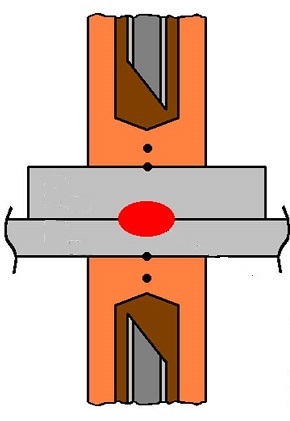In order to lengthen electrode life, cooling the electrode is essential. The water temperature should be the colder the better for electrode life. A large amount of cold water is a requirement. The best temperature for the electrode is the coldest that you can provide. If your plant had a source of water from a well this would be perfect since the water would be about 50 something degrees Fahrenheit year round. While this is great for the electrodes, this temperature for the electrical equipment and electronics is not good during a humid summer. Electronics does not do well with condensation dripping all over it. Transformers may not hold up if they are sweating. So even though the electrodes might do well the weld machine might do poorly with lots of condensate.
Most facilities operate on city water or cooling towers. Summer condensation is still an issue but the temperature swings from winter to summer are not as great and usually condensation can be controlled. The question is - How cold should the water be for the electrodes? The answer is still – As cold as you can provide. If you have a well, city water or cooling tower always take the coldest water available and send it to the electrodes first. Then you can send the return from the electrodes to cool other less critical components secondarily. The electrodes will operate at 55 deg F water or 85 degree F water if you provide them with adequate flow at the proper location, see Articles in this Blog:
WHERE SHOULD THE WATER TUBE BE LOCATED?
HOW MUCH WATER FLOW DO I NFED TO COOL THE ELECTRODES?

Water Tube Located at Bottem of Hole
In severe applications large amounts of heat can be generated during the welding operation. In plant cooling towers may not be sufficient. In these cases a supplemental refrigeration system may be necessary for this particular work station to provide the required cooling and keep the line up and running without excessive downtime. Excessive heat is not limited to the electrodes it can also effect the cables and jumpers which can fail prematurely. Good cooling and water flow is required to keep all components of the weld machine operating properly.
Reference:AWS J1.2 Guide to Installation and Maintenance of Resistance Welding Machines
RWMA - RWMA Resistance Welding Manual 4th edition

